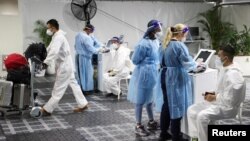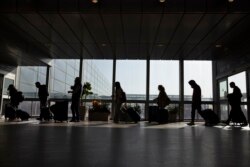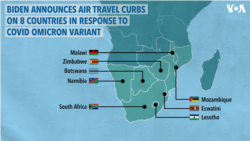The new omicron variant of the coronavirus, first identified in South Africa, is spreading to other countries, with the World Health Organization warning of perils ahead.
Portugal on Monday said it had detected 13 cases of the coronavirus variant, all involving players and staff of top division soccer club Belenenses SAD, one of whom recently returned from South Africa.
Six cases of the omicron variant have been found in Scotland, two each in Canada and Australia, and 13 in the Netherlands.
WHO director-general Tedros Adhanom Ghebreyesus told a special session of the World Health Assembly in Geneva, “This pestilence – one that we can prevent, detect and treat – continues to cast a long shadow over the world.”
“Omicron’s very emergence is another reminder that although many of us might think we are done with COVID-19, it is not done with us,” Tedros said Monday. “We are living through a cycle of panic and neglect. Hard-won gains could vanish in an instant. Our most immediate task, therefore, is to end this pandemic.”
The WHO said the overall global risk related to the omicron variant “is assessed as very high" although no deaths have yet to be linked to it.
The Scottish government said Monday it is not yet known where the six individuals detected there with the omicron variant contracted the virus, but some of the cases may be due to community spread and not direct travel.
In Canada, Ontario Health Minister Christine Elliott said the two people in Ottawa had traveled to Nigeria, which is not in the southern African region where officials say the virus mutation has emerged.
Dutch health officials said Sunday 13 people who recently arrived in the Netherlands on flights from South Africa have tested positive for the new omicron variant of the coronavirus.
The passengers were part of a group of 61 who tested positive following their arrival in Amsterdam Friday. The announcement came shortly after Australia said two cases of the variant were discovered in passengers who recently arrived in Sydney.
Omicron prompts travel bans
Israel and Morocco closed their borders to all foreign visitors Sunday and Japan announced a ban to take effect Tuesday, following news of the new COVID-19 mutation detected in southern Africa. Other countries, including the United States, Canada, Brazil, and some European Union nations, have barred or limited travelers from Africa’s southern region.
U.N. Secretary General Antonio Guterres said he was “deeply concerned about the isolation of southern African countries” due to the travel restrictions.
In a statement Monday, he pointed to low vaccinations rates as the main problem, and said, “The people of Africa cannot be blamed for the immorally low level of vaccinations available in Africa – and they should not be penalized for identifying and sharing crucial science and health information with the world.”
South African President Cyril Ramaphosa said his country is “deeply disappointed” by the travel bans. “These restrictions are completely unjustified and unfairly discriminate against our country and our southern African sister countries,” the South African leader said in a televised address Sunday.
“The prohibition of travel is not informed by science, nor will it be effective in preventing the spread of this variant. The only thing the prohibition on travel will do is to further damage the economies of the affected countries and undermine their ability to respond to and also to recover from the pandemic,” he said.
“The World Health Organization has called for caution as countries have quickly moved to close their borders.
“It is not yet clear whether omicron is more transmissible . . . compared to other variants, including delta,” the WHO said Sunday in a statement. “The number of people testing positive has risen in areas of South Africa affected by this variant, but epidemiologic studies are underway to understand if it is because of omicron or other factors. . . There is currently no information to suggest that symptoms associated with omicron are different from those from other variants.”
US reaction
"Obviously, we're on high alert," top U.S. epidemiologist Anthony Fauci told ABC's "Good Morning America" on Monday.
"It's inevitable that, sooner or later, it's going to spread widely," he said.
Fauci and members of the White House COVID-19 Response Team briefed U.S. President Joe Biden on the latest omicron developments Sunday, the White House said in a statement.
“Dr. Fauci informed the president that while it will take approximately two more weeks to have more definitive information on the transmissibility, severity, and other characteristics of the variant, he continues to believe that existing vaccines are likely to provide a degree of protection against severe cases of COVID,” the statement said.
The swift moves by some countries to seal their borders to travelers from southern Africa have prompted some South African officials and scientists to say they feel like they are being “punished” for their transparency in reporting the variant.
Scientists had warned that vaccine inequity was likely to result in mutations of the COVID-19 virus. While some Western countries are providing third “booster” shots to their populations, tens of millions of people in Africa have not received even one shot of a COVID-19 vaccine.
Margaret Besheer contributed to this story from New York. Some information came from Reuters.







